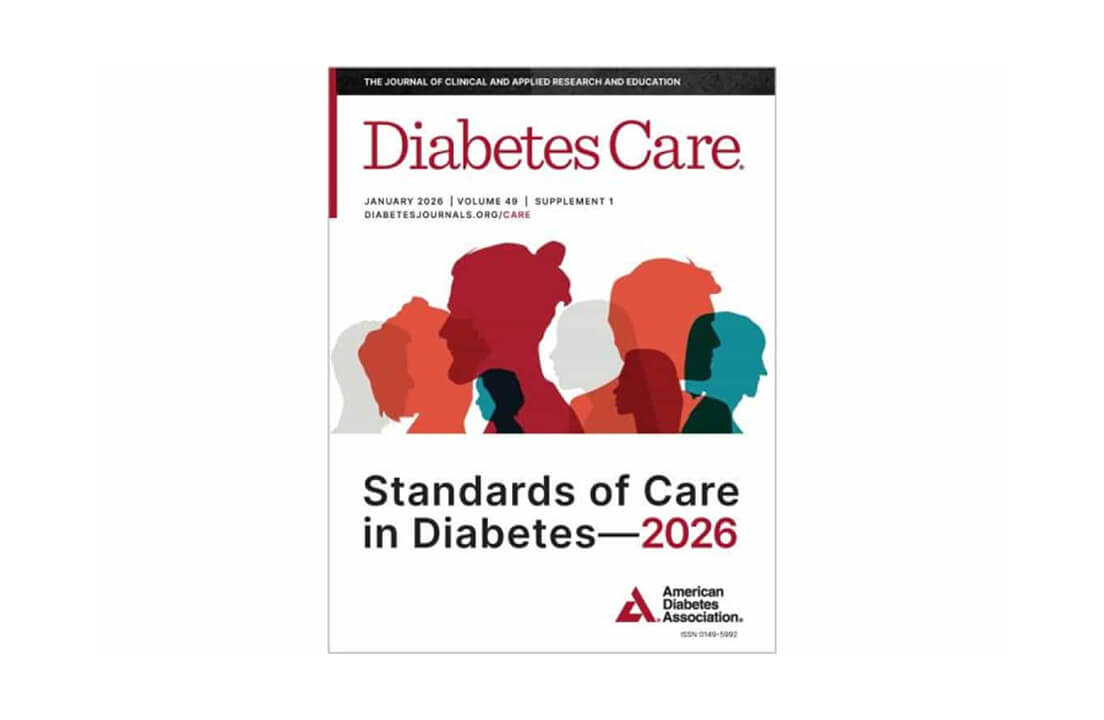T1D Guide
T1D Strong News
Personal Stories
Resources
T1D Misdiagnosis
T1D Early Detection
Research/Clinical Trials
10 Highlights of the ADA 2025 Standards of Care
Glycemic monitoring with CGMs, glucose-lowering agents (GLP-1 receptor agonists), innovative insulin delivery systems, and mental health check-ins are just a few updates to the ADA 2025 Standards of Care.
.jpg)
The American Diabetes Association’s (ADA) Standards of Care in Diabetes revises its directives to include current clinical practice recommendations for individuals with diabetes.
The information gathered at the ADA’s annual Scientific Sessions on cutting-edge research and treatment advancements typically coincides with the new annual publication.
ADA Standards of Care annual guidelines address:
- Prevention, screening, and treatment standards
- Diabetes complications and comorbidities
- Preventing or delaying type 2 diabetes (T2D)
Important Tip: Save the date for the ADA’s 85th Scientific Sessions in Chicago, IL, June 20–23, 2025, at the McCormick Place Convention Center.

2025 ADA Updates
Here are some of the most notable changes in the Standards of Care in Diabetes for 2025:
1. Continuous Glucose Monitoring (CGM) for Type 2 Diabetes
New ADA guidelines encourage T2D individuals not on insulin therapy to use CGMs to track blood glucose levels. In 2016, the FDA approved CGMs to replace blood glucose monitors (BGMs) and daily fingerstick testing for type 1 diabetes (T1D) and T2D. CGMs were primarily used to treat T1D.

While insurance coverage is better, not all insurance companies cover CGMs for diabetes, and coverage can vary between providers. As insurance companies contract with certain manufacturers, access to individuals’ preferred brands of CGM is affected. Part B of Medicare covers CGMs for users 65 and older, yet Medicaid coverage varies from state to state.
Moreover, Dexcom’s Stelo, launched in August 2024, is the first over-the-counter (OTC) glucose sensor with a 15-day wear time. It is primarily designed for type 2 patients (not T1D) who are not yet on insulin therapy.
2. GLP-1 Receptor Agonists
Other key points in the ADA Standards include using GLP-1 medications for purposes other than weight loss. New studies show that the drugs benefit cardiovascular and kidney function and keep blood glucose levels in check.
Again, until further data becomes available, the ADA recommends GLP-1s for T2D management but not T1D control. Exceptions are circulating for T1Ds and latent autoimmune diabetes in adults (LADA) with severe insulin deficiency, and recent evidence suggests that GLP-1s may prevent long-term complications in type 1 patients.
3. Early Type 1 Diabetes Screening
One ADA addition regarding T1D is increased recommendations for early detection of type 1 diabetes using antibody testing. This use of antibody-based screening for presymptomatic type 1 diabetes is encouraged for individuals with a family history or known genetic risk.

While the exact causes of type 1 diabetes are still unknown, we do know the autoimmune condition may involve genetic and environmental factors.
Breakthrough T1D (formerly JDRF) cites that certain genes increase the likelihood of developing T1D. “If you have an immediate family member with T1D, your chances of developing the condition are one in 20, which is 15 times higher than the general population.
What’s more, T1D can be spotted before the symptoms and life-threatening complications arise, and there are drugs now to delay the onset for up to several years.
Speak with your doctor to receive information on T1D testing. You can also order a home test kit from TrialNet, an international T1D research and clinical care network.
Interesting Fact: T1D Strong is developing an accessible, cost-effective DNA test kit to diagnose type 1 diabetes. It’s currently undergoing FDA approval.
4. Diabetes Medication Shortage Guidelines
The ADA also addressed the 2024 medication shortage and provided a course of action in 2025. Just as the government enforced the most significant insulin price cut in many years, insulin manufacturers experienced unexpected shortages that affected millions.
In addition to the manufacturing delays, many insulin companies are discontinuing their products. Some insurance plans now only cover a narrow range of insulin, making it even more difficult for patients to obtain this life-saving drug.
Novo Nordisk
In some areas, the Fiasp FlexTouch prefilled pens and vials were and are still depleted. Novo Nordisk also had limited supplies of Ozempic, Novolin R Flexpens, and Novolog 10 mL vials.
Eli Lilly
In 2024, Humalog and insulin lispro vials were in short supply. Lilly also discontinued its 3-milliliter vials of Humalog.
Sanofi Aventis
Sanofi discontinued production of generic Lantus® in May 2024.
Humulin M3
There was also a shortage of Humulin M3, most commonly used in older T2D patients.
While the ADA monitors the situation, it advises individuals to consult their healthcare providers to discuss alternatives. Moreover, the new ADA Standards of Care provides resources and information on patient assistance programs, insurance coverage options, and other ways to help manage expenses.
Check here for ways you can lead the fight for affordable insulin for all.

5. Improved Individualized Care
A More Person-Centered Approach
The ADA also encourages doctors and patients to make combined health goals while considering their risk factors and potential complications. The ADD encourages routine mental health checkups for patients and their caregivers dealing with diabetes distress, anxiety, and burnout.
Examination of Comorbidities
Finally, the new Standards of Care focuses on modifying treatment plans based on individual needs, broadening the scope to include factors like age, ethnicity and lifestyle.
The importance of “individualized care” also refers to a person’s medical history, preferences, and social determinants. It involves looking closely at all health conditions that impact diabetes management rather than the typical universal one-size-fits-all solution.
A Focused Socioeconomic Assessment
The new ADA approach addresses the poor social determinants and lack of education for diabetes management, which is becoming a growing concern as diabetes faces epidemic proportions.
Other Conference Themes Include:
6. Weight Lifting
Recent 2025 guidelines encourage strength training two to three times a week to improve muscle sensitivity. Lifting weights also builds strong bones and helps T1Ds bolster a healthy metabolism.

7. Cannabis Use
The ADA advices against the use of recreational marijuana use for people with type 1 diabetes. With the recent legalization in some states, studies now show an increased risk of diabetic ketoacidosis (DKA) in specific individuals, with signs similar to cannabinoid hyperemesis syndrome (CHS), a condition with severe bouts of vomiting.
8. Drink Water not Soft Drinks with Artificial Sweeteners
New recommendations endorse water over drinks with artificial sweeteners that may contain harmful ingredients and be detrimental over long-term use.
Here are top tips to stay hydrated:
- Choose sparkling water or seltzer over sugary or artificial sweetened drinks
- Mix up your water options with healthy vitamin flavored boosters
- Drink a 8 oz. glass of water first thing in the a.m. and follow the recommended guidelines for your weight and gender
- Check the color of your urine for overall hydration health:
- Clear: Indicates high hydration levels.
- Pale yellow: Normal hydration.
- Light amber: May indicate slight dehydration
9. Sexual Health
The new guidelines encourage men to undergo screening for hypogonadism (low levels of sex hormones) with a morning serum total testosterone test. Symptoms and signs include:
- Decreased libido
- Erectile dysfunction
- Infertility
- Loss of muscle mass
- Fatigue
- Mood changes (irritability, depression or anxiety)
Also, ADA guidelines added a new section on female dysfunction with recommendations for depression, anxiety, recurring urinary tract infections and screening for symptoms of genitourinary syndrome of menopause.
10. Open-Source AID Systems
Lastly, the ADA supports open-source automated insulin delivery (AID) systems, directing healthcare providers to aid patients interested in enhancing AID system settings for safe and efficient insulin delivery.

ADCES Live Webinar
For a more in-depth review of the ADA Standards of Care in Diabetes, the Association of Diabetes Care and Education Specialists (ADCES) is hosting a live webinar on January 15, 2025, from 1:00 p.m. to 2:30 p.m. EST. The 90-minute webinar will assess the recent updates and provide a question-and-answer period.


.webp)





.webp)


.jpg)


.jpg)
.jpeg)

.jpg)
.jpg)



.jpg)



.jpg)

.jpg)



.jpg)

.jpg)
.jpg)



.jpg)

.jpg)




.jpg)

.jpg)
.jpg)
.jpg)
.jpg)
.jpg)
.jpg)

.jpg)
.jpg)
.jpg)

.jpg)



.jpg)
.jpg)
.jpg)
.jpg)


.jpg)
.jpg)


.jpg)
















.jpg)












.webp)

















.webp)